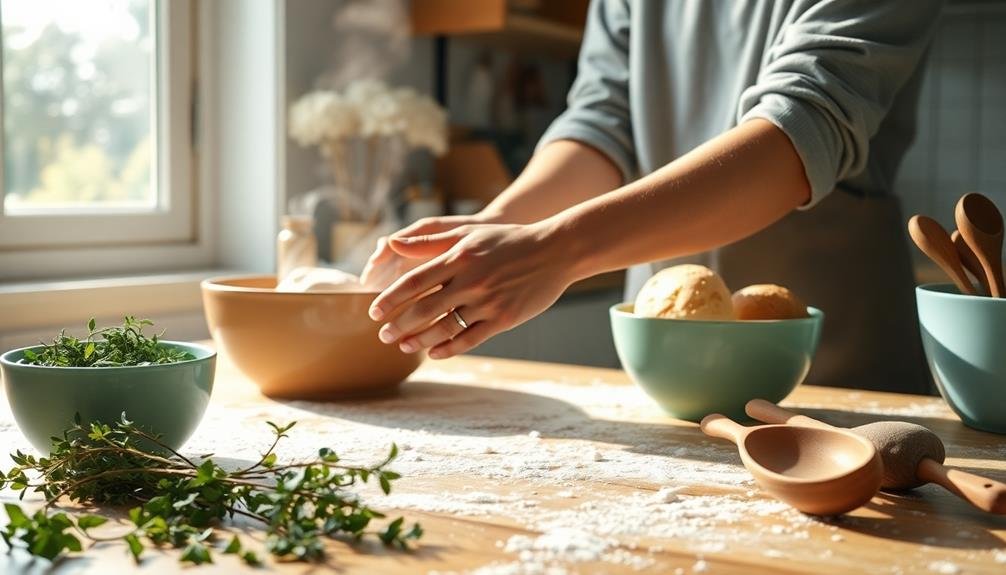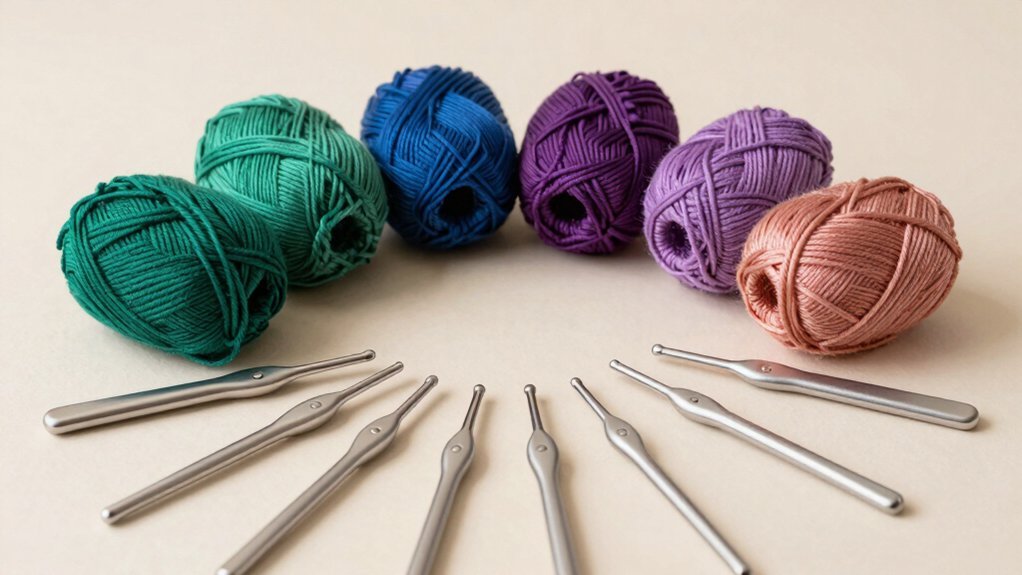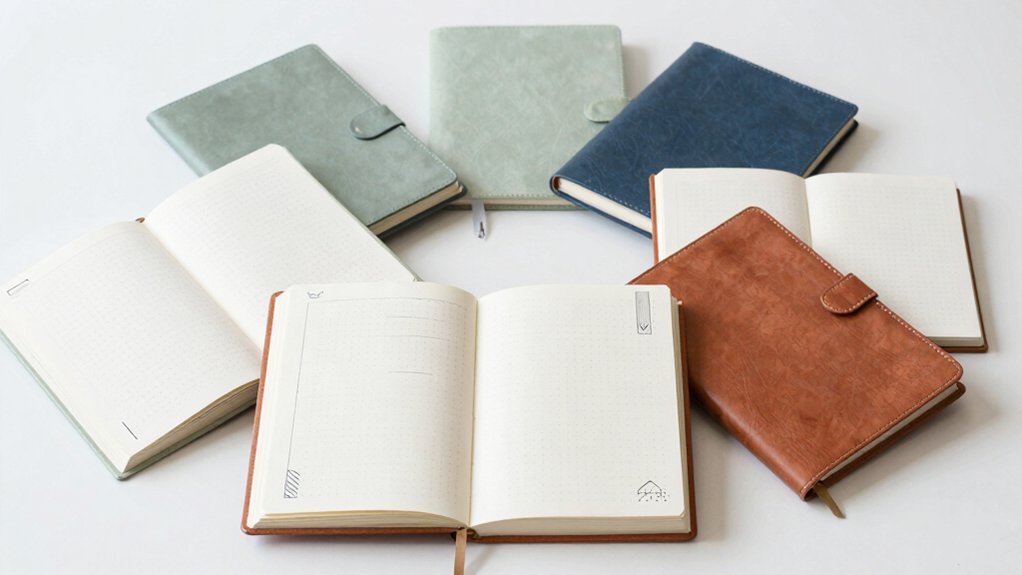Baking can be a powerful stress-reliever, transforming your kitchen into a calm sanctuary. As you measure ingredients and follow recipes, you'll engage in mindfulness, letting worries slip away. The repetitive motions of kneading dough or icing cakes create a meditative state, grounding you in the present moment. Aromatic scents from vanilla, cinnamon, or fresh bread can boost your mood and well-being. Embracing imperfections in your creations fosters self-acceptance and creativity. Sharing your baked goods with others spreads joy and strengthens connections. By exploring these soothing kitchen rituals, you'll discover a delicious path to relaxation and inner peace.
The Therapeutic Power of Baking

Many people find solace in the act of baking. When you're feeling stressed or anxious, heading to the kitchen can provide a much-needed escape. The therapeutic power of baking lies in its ability to engage your senses and focus your mind on a tangible task.
As you measure ingredients, you're practicing mindfulness. The repetitive motions of mixing, kneading, and rolling dough can be meditative, helping to calm your thoughts. You'll find that following a recipe step-by-step provides structure and control, which can be comforting when other aspects of life feel chaotic.
Baking also offers a creative outlet. You can experiment with flavors, decorations, and presentation, allowing for self-expression. The process of creating something from scratch can boost your self-esteem and provide a sense of accomplishment.
Moreover, the aromas that fill your kitchen as you bake can trigger positive emotions and memories. The act of sharing your baked goods with others fosters connection and gratitude, further enhancing your mood.
Mindful Ingredient Selection
When selecting ingredients for your kitchen rituals, prioritize quality over quantity to enhance your culinary experience.
Focus on seasonal produce to connect with nature's rhythms and enjoy peak flavors.
You'll find that exploring organic and local options not only supports your community but also introduces you to fresher, more flavorful ingredients.
Quality Over Quantity
Choosing quality ingredients forms the foundation of any soothing kitchen ritual. When you prioritize quality over quantity, you'll find that your baking experience becomes more satisfying and the results more delicious. Focus on selecting fresh, whole ingredients that haven't been overly processed. Opt for organic produce when possible, and choose free-range eggs and hormone-free dairy products.
Don't be afraid to splurge on high-quality vanilla extract or premium chocolate. These small investments can greatly elevate your baked goods. Remember, it's better to use a small amount of an exceptional ingredient than a large quantity of a mediocre one.
| Ingredient | Quality Considerations |
|---|---|
| Flour | Unbleached, stone-ground |
| Sugar | Raw, unrefined |
| Butter | Grass-fed, cultured |
| Eggs | Pasture-raised, organic |
| Spices | Whole, freshly ground |
Seasonal Produce Focus
Embracing seasonal produce is a cornerstone of mindful ingredient selection. When you focus on ingredients that are at their peak, you're not only ensuring the best flavors but also connecting with nature's rhythms.
As you plan your baking projects, consider what's currently abundant in your local markets or gardens.
In spring, you might incorporate tender rhubarb into tarts or experiment with fragrant strawberries in shortcakes.
Summer brings an array of stone fruits perfect for cobblers and pies, while fall offers crisp apples and earthy pumpkins for comforting baked goods.
Even winter has its bounty, with citrus fruits brightening up cakes and preserves.
Organic and Local Options
Quality stands at the forefront of mindful ingredient selection, and organic and local options often deliver superior results. When you choose organic ingredients, you're opting for produce and products free from synthetic pesticides and fertilizers. This choice can enhance the flavor of your baked goods while supporting sustainable farming practices.
Local options bring freshness to your kitchen. By sourcing ingredients from nearby farms and producers, you're ensuring peak ripeness and taste. You'll also reduce the carbon footprint associated with long-distance transportation. Visit farmers' markets or join a community-supported agriculture (CSA) program to access the best local offerings.
Consider the impact of your choices on both your baking and the environment. Organic eggs might yield richer custards, while locally milled flour could provide a unique texture to your bread.
As you incorporate these mindful selections into your baking routine, you'll likely notice an improvement in flavor and satisfaction with your creations. Remember, every ingredient tells a story – make yours one of conscious consumption and community support.
Kneading Away Worries

Bread making's therapeutic power lies in the kneading process. As you work the dough, you'll find yourself entering a meditative state, focusing on the rhythmic motion of your hands. This repetitive action can help release tension and clear your mind, allowing you to process your thoughts and emotions.
The physical act of kneading engages your senses, grounding you in the present moment. You'll feel the texture of the dough change beneath your fingers, smell the yeasty aroma, and hear the soft sounds of the dough being worked. This multisensory experience can be incredibly calming and centering.
Here's a quick guide to kneading techniques and their benefits:
| Technique | Description | Benefits |
|---|---|---|
| Push-fold-turn | Push dough away, fold back, turn 90° | Builds gluten, relieves stress |
| Stretch-and-fold | Stretch dough, fold over itself | Develops strength, improves focus |
| Slap-and-fold | Slap dough on surface, fold in half | Releases tension, builds arm strength |
| Pincer method | Pinch and squeeze dough repeatedly | Improves dexterity, promotes mindfulness |
As you knead, you're not just creating bread; you're crafting a moment of peace in your day. The transformation of simple ingredients into a nourishing loaf can be deeply satisfying, providing a sense of accomplishment and connection to age-old traditions.
Aromatherapy in the Kitchen
The kitchen's aromatic power can transform your mood and enhance your well-being. As you bake, you're surrounded by a symphony of scents that can soothe your mind and elevate your spirits.
Vanilla's sweet, comforting aroma can reduce stress and anxiety, while cinnamon's warm, spicy scent can boost cognitive function and improve focus.
Citrus fruits like lemons and oranges release invigorating scents that can energize you and lift your mood. When you zest these fruits, you're not just adding flavor to your dish; you're releasing mood-enhancing essential oils into the air.
The scent of fresh herbs like rosemary and basil can improve memory and increase alertness.
As you bake bread, the yeasty aroma can trigger feelings of comfort and nostalgia. The smell of chocolate releases endorphins, promoting feelings of happiness and relaxation.
Even the scent of coffee brewing can reduce stress and increase mental clarity.
Decorating as Meditation

Decorating cakes and cookies can be a form of moving meditation, allowing you to focus your mind and find tranquility.
You'll discover peace in the rhythmic motions of piping intricate designs or smoothing fondant to perfection.
As you master mindful icing techniques and embrace the zen of cake artistry, you'll transform a simple baking task into a soothing ritual that nourishes both body and soul.
Mindful Icing Techniques
Icing a cake or decorating cookies can transform into a meditative practice when you approach it mindfully. Focus on each movement of your hand as you pipe designs or spread frosting. Feel the weight of the piping bag or spatula, and observe how the icing flows and takes shape.
To enhance your mindful icing experience, try these techniques:
| Technique | Description |
|---|---|
| Breathing | Sync your breath with your movements |
| Visualization | Picture the design before you create it |
| Slow motion | Deliberately slow down your actions |
| Sensory focus | Notice textures, colors, and scents |
| Gratitude | Appreciate the process and your creation |
As you practice these techniques, you'll find that icing becomes more than just decoration – it's a form of stress relief. You'll lose yourself in the repetitive motions and intricate designs, allowing your mind to quiet and your body to relax. Don't worry about perfection; instead, embrace the imperfections as part of the process. Let go of judgments and simply enjoy the act of creating something beautiful and delicious.
Zen of Cake Artistry
Building on the mindful icing techniques, we can expand our focus to explore the broader domain of cake artistry as a meditative practice. As you investigate cake decorating, you'll find that it's not just about creating a beautiful dessert; it's a journey of self-expression and mindfulness.
When you approach cake artistry with a zen mindset, you'll notice how each step becomes a form of meditation. Begin by centering yourself and focusing on your breath. As you mix colors, knead fondant, or pipe intricate designs, let your mind settle into the present moment.
Pay attention to the textures beneath your fingertips and the subtle changes in hue as you blend shades. Allow your creativity to flow freely, embracing imperfections as part of the process.
Don't rush; instead, savor each movement and decision. As you work, you'll likely find that your worries fade away, replaced by a sense of calm focus. This meditative state not only enhances your artistic output but also provides a much-needed respite from daily stressors, making cake artistry a truly soothing kitchen ritual.
Sharing Baked Goods With Others
The joy of baking extends far beyond your own kitchen. When you share your baked goods with others, you're not just offering a treat; you're sharing a piece of yourself and your creativity. It's a gesture that can brighten someone's day, strengthen relationships, and create lasting memories.
Consider surprising your coworkers with a batch of homemade cookies or bringing a freshly baked pie to a family gathering. You'll notice how faces light up and conversations spark around your creation.
Sharing baked goods can also be a form of comfort during difficult times. A warm loaf of bread or a batch of muffins can convey care and support when words fall short.
Don't limit yourself to just friends and family. Extend your baking generosity to neighbors, local community centers, or even strangers through bake sales or food drives.
You'll find that the act of giving away your baked goods can be just as rewarding as the baking process itself. It's a simple yet powerful way to connect with others and spread joy through your culinary skills.
Frequently Asked Questions
Can Baking Help With Specific Mental Health Conditions Like Depression or Anxiety?
Yes, baking can help with depression and anxiety. You'll find it's a therapeutic activity that engages your senses, promotes mindfulness, and boosts self-esteem. It can provide a sense of accomplishment and joy, reducing stress and improving mood.
Are There Any Baking Activities Suitable for Children to Relieve Stress?
You can involve kids in stress-relieving baking activities. Let them decorate cookies, roll out dough, or mix ingredients. Simple recipes like muffins or no-bake treats are perfect. It's a fun, hands-on way to help children unwind.
How Can I Incorporate Baking Into My Daily Routine for Stress Relief?
You can start small by baking a simple treat daily. Set aside 30 minutes for this ritual. Try making muffins, cookies, or quick breads. Focus on the process, not perfection. It'll become a relaxing habit.
What Are Some Low-Sugar Baking Options for Health-Conscious Stress Relief?
You can try baking with natural sweeteners like stevia or monk fruit. Opt for whole grain flours and add nuts or seeds for nutrition. Experiment with savory bakes like herb bread or vegetable tarts for a low-sugar stress relief option.
Can Baking Therapy Be Effective for Those With Limited Culinary Skills?
Yes, baking therapy can work for novice cooks too! You don't need to be a pro to enjoy its benefits. Start with simple recipes, focus on the process, and remember it's about stress relief, not perfection. You'll improve with practice.
In Summary
You've discovered the secret: baking isn't just about creating delicious treats. It's a powerful stress-relief tool right in your kitchen. From mindfully selecting ingredients to kneading dough and decorating cookies, you're engaging in a therapeutic process. The aromas soothe your senses, while the act of sharing your creations spreads joy. Next time you're feeling overwhelmed, head to the kitchen. You'll find peace, purpose, and maybe even the perfect chocolate chip cookie.





Leave a Reply